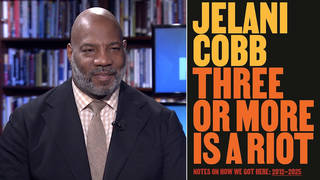
Guests
- Steve Reillyinvestigative reporter and data specialist for the USA Today Network. His new exclusive is called “Hundreds Allege Donald Trump Doesn’t Pay His Bills.”
- Russ Buettnerreporter for The New York Times. His new piece is called “How Donald Trump Bankrupted His Atlantic City Casinos, But Still Earned Millions.”
- Charles Baglireporter for The New York Times. His new piece is called “How Donald Trump Bankrupted His Atlantic City Casinos, But Still Earned Millions.”
A new USA Today exposé finds hundreds of former employees and contractors have accused Republican presidential presumptive nominee Donald Trump and his businesses of failing to pay them for their work. Victims have included a dishwasher in Florida, a glass company in New Jersey, a carpet company, a plumber, 48 waiters, dozens of bartenders at his resorts and clubs, and even several law firms that once represented him in these labor lawsuits. We speak to Steve Reilly, an investigative reporter and data specialist for the USA Today Network. His new exclusive is called “Hundreds Allege Donald Trump Doesn’t Pay His Bills.”
Transcript
AMY GOODMAN: Today we’re looking at the business record of the presumptive Republican presidential nominee, Donald Trump. We turn now to look at a new USA Today exposé that found hundreds of former employees and contractors have accused Donald Trump and his businesses of failing to pay them for their work. Victims have included a dishwasher in Florida, a glass company in New Jersey, a carpet company, a plumber, 48 waiters, dozens of bartenders at his resorts and clubs, and even several law firms that once represented him in these labor lawsuits.
Joining us from New Orleans is Steve Reilly, an investigative reporter and data specialist for the USA Today Network. His new exclusive is headlined “Hundreds Allege Donald Trump Doesn’t Pay His Bills.”
Steve Reilly, welcome to Democracy Now! Explain. What evidence do you have for that? Tell us these individual stories.
STEVE REILLY: Right, so, just the broader context, USA Today started by gathering the history of litigation involving Donald Trump and his companies, more than 3,500 lawsuits which involved Trump or his companies over the past several decades. And so, our most recent article, we looked, within that body of litigation, at lawsuits involving allegations of nonpayment against Donald Trump’s companies, and specifically more than 60 lawsuits, along with hundreds of other mechanic’s liens, judgments, other filings, which indicate there are allegations Donald Trump hasn’t paid contractors, workers, employees for their services.
So, I can talk about specific examples. The article discusses the Friel cabinetry company, based out of Philadelphia, which did work on the casinos in Atlantic City in the 1980s. They built bases for slot machines, registration desks. And there was a dispute at the end of their work over about $83,000. And the allegation is that Donald Trump didn’t pay the company for the work, which eventually contributed to the bankruptcy of that company, which employed about 80—I’m sorry, 20 workers in the 1980s.
AMY GOODMAN: Well, let’s go to Paul Friel speaking to your paper, USA Today.
PAUL FRIEL: We did some work for a company called Perini Corporation, who was the general contractor for a hotel called Harrah’s that Trump bought. And Donald said, “Well, honestly, we owe you the money, and we are willing to let you—let you be happy with what you’ve been paid on the contract, and—or you can simply take us to court.”
AMY GOODMAN: Steve Reilly, expand on that.
STEVE REILLY: Right, so, the company decided that, you know, they—what they do is they have what’s called a punch card approved by the general contractor. So the work was essentially approved, according to the gentleman who just spoke, Paul Friel. The work was approved. They went for the final payment and were called into a meeting with Donald and Robert Trump and were told, “You’re not going to be paid the final invoice of about $83,000, but you’re welcome to come back and do future work for The Trump Organization.” So, the Friel cabinetry company tried to recoup the money. They hired a lawyer, but dropped any attempt to regain that money because of legal fees, eventually. And after that, Paul Friel related that the company was unable to find work in Atlantic City from that point on.
AMY GOODMAN: You talk about Juan Carlos Enriquez, who owned The Paint Spot in South Florida?
STEVE REILLY: Right. That’s another example of a company. This is a case that’s still ongoing. The dispute is over paint work at the Doral resort in Florida. There’s a foreclosure proceeding, and there’s a dispute over payment for the work there that’s still going on right now.
AMY GOODMAN: And you also talk about Trump’s companies having been cited for 24 violations of the Fair Labor Standards Act since 2005 for failing to pay overtime or minimum wage, according to the U.S. Department of Labor data. Can you talk about what you found there?
STEVE REILLY: Exactly. Those are, since 2005, disputes over back wages and overtime and minimum wage. And Trump was—had to resolve those cases by paying back wages in both cases to some of his hourly employees at Trump Mortgage and one of his casinos.
AMY GOODMAN: Steve Reilly, I want to turn to audio of your interview with Donald Trump. You raised allegations by a dishwasher and other hourly employees who said they weren’t paid fairly by Trump.
STEVE REILLY: I wanted to make sure I gave you a chance to respond to, as the article mentions, a couple allegations by, I believe, a dishwasher and a couple other hourly employees, and some Department of Labor citations for violations of the Fair Labor Standards Act. And they seem to be—
DONALD TRUMP: When is—
STEVE REILLY: —over unpaid overtime.
DONALD TRUMP: When is this?
STEVE REILLY: The U.S. Labor Department violations were in 2005 and 2008.
DONALD TRUMP: That’s 10 years ago, 10 years ago, Steve. I have thousands of employees, Steve. You’re talking about a dishwasher from 10 years ago. I don’t know, Steve. You don’t sound like you’re going to be very good to me, but that’s OK. Hey, look, treat it fairly, Steve. I can’t—you know, how do you respond when a reporter from a newspaper that you respect calls up and talks about a dishwasher 10 years ago who said he didn’t get paid or something happened?
STEVE REILLY: Right—
DONALD TRUMP: Not fair—not fair reporting, Steve. Not fair reporting. I pay my bills on time. I’m proud to do it. I have one of the best records in the country for paying on time, Steve, OK?
STEVE REILLY: OK. So your company doesn’t have any systematic effort to—you know, you don’t systematically—
DONALD TRUMP: We have a total systematic effort: We pay everybody what they’re supposed to get paid, and we pay on time. And we employ thousands and thousands of people.
AMY GOODMAN: And, Steve Reilly, I want to play one more excerpt of your interview with Donald Trump.
STEVE REILLY: We have some people here who said that you alleged they did shoddy work, and in response to that—
DONALD TRUMP: Yeah.
STEVE REILLY: —your companies didn’t pay them at all.
DONALD TRUMP: If people do bad work—we have a contract. I’ll pay—I actually pay on time and even ahead of schedule, if people do good jobs. Now, Steve, if somebody does a bad job, then, as far as I’m concerned, they violated their—our trust and their contract. You understand. But I pay—I pay my bills on time. I’m very proud of it. I’ve always paid my—you know, I just—I’m a believer in that.
AMY GOODMAN: Steve Reilly, your response? That, again, Donald Trump being interviewed by you for USA Today.
STEVE REILLY: Well, we heard Mr. Trump’s response to some of these cases. He is of the—you know, he argued that, you know, any case where he didn’t make full payment or his companies didn’t make full payment for work is a case where the work was late or incomplete or shoddy. That does contradict some of the allegations that we reviewed, you know, especially the Friels’ story, that they were invited to come back and do future work. That type of story was related by a couple other contractors, as well. And also, you know, regarding the U.S. Department of Labor violations, you heard, you know, Mr. Trump didn’t directly speak to those. He feels, you know, it was 10 years ago, which is—which is true, but we didn’t get a full, you know, response as to his feelings about those late payments to hourly employees.
AMY GOODMAN: And as you write, with your reporting coinciding with The New York Times reporters we were just talking to, at Trump’s Taj Mahal casino in Atlantic City, “records released by the New Jersey Casino Control Commission in 1990 show [that] at least 253 subcontractors weren’t paid in full or on time, including workers who installed walls, chandeliers [and] plumbing.” Was this is also what you both found, Russ and Charles?
CHARLES BAGLI: Sure. I mean, there was, I think, $100 million worth of claims at the Taj Mahal in 1990, ’91.
AMY GOODMAN: How many? How much?
CHARLES BAGLI: I think it was about $100 million. And it created a huge turmoil in the community in Atlantic City, because a lot of these were small businesses. So, when you don’t get $83,000 and then you have to go to hire a lawyer to fight for you, you can bankrupt a small business.
AMY GOODMAN: What was Donald Trump’s response to your article, Russ?
RUSS BUETTNER: He didn’t question any of the points we made, that he saddled it with debt, that he pulled a lot of money out and that his revenue lagged behind other casinos, nor that he shifted his personal debt onto the shareholders in his casinos. Some of the more specific things, he said he didn’t recall. The thing that he stressed over and over and over again that he wanted to make sure everyone who thought about this understood was that he personally made a lot of money from the casinos. And he wasn’t too concerned with that other people might have not done well.












Media Options